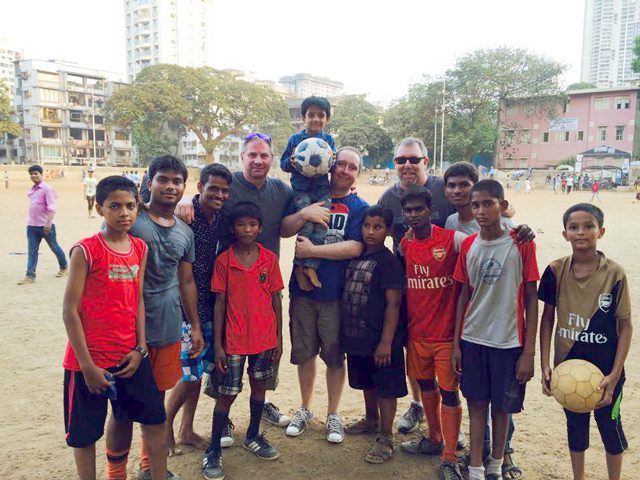IHQ communications team travels to India to document the work of The Salvation Army
Three members of the International Headquarters (IHQ) communications section and Howard Dalziel, Program Resources Department, IHQ, recently traveled to India to report on its diverse ministry.
From Mumbai in the west to Kolkata in the east, from Nagercoil in the far south to Amritsar in the north, and from the searing heat of the bustling capital New Delhi to the cooler Himalayan foothills of Darjeeling, the team wrote about its experiences at salvationarmy.org/indiablog.

“My journey to India has been a long time in planning—and it’s really only now that I understand that because of the gift of reflection,” wrote Major John Murray, IHQ communications secretary, who was accompanied by David Giles, web manager, and Gary Rose, multimedia resource assistant and Howard Dalziel, international school coordinator. “Mission experiences in Cuba, Pakistan and Africa have shaped my understanding of integrated mission and I value the opportunity to build community by engaging and conversation and fellowship.”
The team explored Salvation Army hospitals, schools, training programs and anti-human trafficking initiatives along the way, with the key output being a documentary entitled, India – For The Love of God, to be premiered at the Boundless Film Festival, part of The Salvation Army’s 150th anniversary international congress in July.
While in Mumbai, the team visited The Salvation Army Jeevan Asha night shelter, which provides accommodation and a range of complementary care facilities to boys in the Kamathipura district of the city, one of Mumbai’s red light districts. The boys, ages 7-16, have one thing in common: their mothers are engaged in the sex trade in this area in the local community.
“This means that the alternatives are either spending the night wandering the streets with all the associated risks, or being accommodated at a center like Jeevan Asha,” Giles wrote. “The scale of the problem is immense—just in this one part of the city, there are an estimated 5,000 children on the streets. What reason do these young people have to be hopeful? The answer was as striking as it was humbling and inspiring: Jesus.”

He said without exception, the boys spoke of their personal faith and hope. These boys had chosen to take part in a special week of “Vacation Bible School” activities, and shared with the IHQ team their ambitions. One wanted to become a manager of a successful company and another wanted to be a professional footballer.
One of the older guys, aged 21, had been in the Jeevan Asha project for seven years and had been so affected by its ministry that he chose to study social work and join The Salvation Army as a project worker to help other vulnerable boys.
The team also visited The Salvation Army MacRobert Hospital in Dhariwal, which has served the the poor since 1926. It has 102 beds and 101 full-time staff members.
“We met a young girl who lives in a nearby community who had undergone an eye operation the previous day,” Murray wrote. “Her family are farm laborers and unable to pay for an operation to remove the cataracts that had taken her sight. Following the [operation], she told us that she could now see properly for the first time in many years.”
MacRobert has a particular specialism in ophthalmology, but also provides general and midwifery services. Scores of people wait to be seen by a doctor, and staff estimates that more than 100 people are seen by a clinician on a given day. MacRobert is also a center of learning and professional development with 244 nurses in its training college, both male and female.
“We were struck by the professionalism, the passion and the desire to serve a community in need,” Murray said.
From MacRobert, the team traveled to Batala, where The Salvation Army has a school that serves the local rural community.
“The reason we do schools is to provide an education for children who would otherwise not be able to afford or access one, perhaps because of a special need,” said Howard Dalziel, IHQ schools coordinator. “Our focus is on breaking down barriers for the marginalized.”
Next, the team made it to New Delhi, India’s capital, a bustling metropolis of buildings, businesses, highways and history. It’s also home to The Salvation Army India Northern territorial headquarters.
In the southern part of the city, the Army opened a corps in response to the growing Burmese refugee population. The refugees started leaving Burma about 15 years ago in response to the political crisis and today thousands of Burmese call Delhi home. However, many of them are undocumented immigrants and as such they cannot work nor go to school.
The corps is situated on the second floor of a multi-story walk-up apartment.
“I was told that several Burmese families would typically occupy one of the units,” Murray wrote. “The children are comfortable in the setting and, not unlike kids everywhere, they seem happy just to be with their friends.”
The Army will soon open a formal education program for 50 children and adults where they will teach Hindi and English—essential to gain a foothold in the working world.
“‘Incredible India’—that pretty much sums up our two-week, eight-city experience of this vast and diverse country,” Murray wrote. “Our blogs and photos are just the beginning of our storytelling.”











